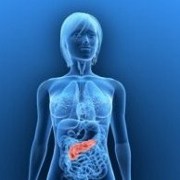Rapid weight loss with jaundice may signal autoimmune pancreatitis. This inflammatory condition looks like pancreatic cancer in terms of symptoms, lab tests, and imaging studies, and is difficult to diagnose. According to a review from the Cleveland Clinic, 11 percent of patients who undergo surgery for cancer of the pancreas are found to have autoimmune pancreatitis. Researchers in the United States, Japan, and Korea are working to establish improved diagnostic criteria to avoid unnecessary surgery and to allow physicians to start immunosuppressive drug therapy promptly.
Most autoimmune diseases affect more women than men. This one is the opposite: twice as many men as women are affected. The reason for this is unknown. Most patients are at least 50 years old. The autoimmune process was first proposed to be a factor in chronic pancreatitis in 1961. It took three decades for autoimmune pancreatitis to be codified as a separate disease.
Pancreatitis in general can be acute or chronic. Besides weight loss and jaundice, symptoms may include:
1. Abdominal pain
2. Chills
3. Clammy skin
4. Fatty stools
5. Fever
6. Nausea and vomiting
7. Sweating
8. Weakness
Chronic pancreatitis is often caused by alcohol abuse, but the autoimmune form is seen in patients with no history of alcohol use. The normal pancreas produces the hormones insulin and glucagon, as well as enzymes important for digesting fat. Diabetes is the most common disease of the pancreas.
The inflamed pancreas may block the bile duct, so that bilirubin produced by the liver is not able to reach the intestines normally. The skin and whites of the eyes turn yellow, or brown in severe cases. This condition is called obstructive jaundice, and can be corrected with surgery.
The good news about autoimmune pancreatitis is that it responds dramatically to corticosteroid treatment in most cases. In fact, Reference 1 suggests a trial of one to two months of steroid treatment for cases that are difficult to diagnose. If the symptoms do not improve, then the diagnosis should be re-evaluated.
Some cases clear up spontaneously without treatment and remain in remission. However, most autoimmune diseases follow a course of relapse and remission. Relapse rates for autoimmune pancreatitis range from six to 32 percent.
References:
1. Law R et al, “Autoimmune pancreatitis: A mimic of pancreatic cancer”, Cleveland Clinic Journal of Medicine 2009 Oct; 76(10): 607-14.
2. More on chronic pancreatitis:
https://health.google.com/health/ref/Chronic+pancreatitis
Linda Fugate is a scientist and writer in Austin, Texas. She has a Ph.D. in Physics and an M.S. in Macromolecular Science and Engineering. Her background includes academic and industrial research in materials science. She currently writes song lyrics and health articles.




Add a CommentComments
There are no comments yet. Be the first one and get the conversation started!